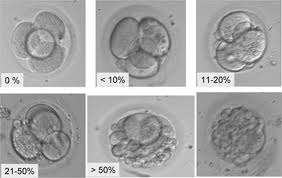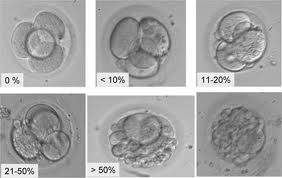
 Embryo fragmentation is a fairly common occurance. It happens when there is an uneven division of the cells of the embryo.
Embryo fragmentation is a fairly common occurance. It happens when there is an uneven division of the cells of the embryo.
It's as if you were breaking apart a piece of crusty bread. When you try to break the bread apart, crumbs or fragments are formed. These fragments are of no use to the embryo and are considered “junk” pieces of cytoplasm. The higher the degree of fragmentation, the lower the likelihood of pregnancy.
Embryo fragmentation can occur with both natural conception and in the IVF process. In the latter case, it can lead to failed IVF, but not necessarily.
Typically the laboratory denotes the degree of fragmentation by assigning it a grade along a four-point grading scale. One indicates an embryo with little fragmentation (<5%), and four indicates a high degree of fragmentation (>40%) and an embryo that is non-viable. Excessive embryo fragmentation (grade 3-4) is considered a marker for embryos with compromised developmental potential. These embryos rarely make it past the eight-cell stage, and it is unlikely that they will make it to the blastocyst stage. Embryos with >20% fragmentation may continue to develop normally to the blastocyst stage, although pregnancy rates may be compromised.
Fragmentation is typically due to an inherent defect in the egg, and most likely will be consistent from one cycle to the next. However fragmentation can also be due to a poor ovarian stimulation and can be improved as the protocol or management of the stimulation is changed on subsequent cycles.
To see a fertility specialist who is a board-certified physician with excellent success rates, make an appointment at one of InVia’s four Chicago area fertility clinics.

Entire Website © 2003 - 2020
Karande and Associates d/b/a InVia
Fertility Specialists
